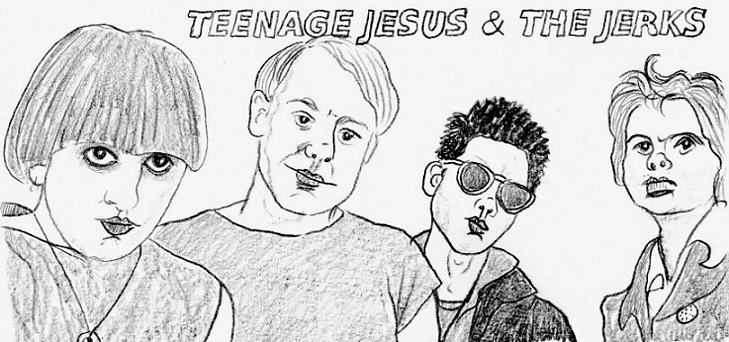
I'm in a closet and I can't breath / Won't you just please release me / I can't move and my kidneys fail / The size of this room feels like jail / I can't talk I can't enunciate / And I'm treated like Sharon Tate / Suburban wealth and middle class well being / All it did was strip my feelings / Personality down the drain / After all who needs a brain / Take a bullet to my eyes / Blow them out and see if I die. Nochmals Punk, yeah, oder No Wave, wie man diese Musik aus New York auch zu nennen pflegte. Die Band Teenage Jesus & The Jerks existierte von 1976 bis 1979 und war in New York beheimatet. Gegründet wurde die Band von Lydia Lunch alias Lydia Koch (Vocals, Guitar) und James Chance alias James Siegfried (Saxophone). Weitere Mitglieder waren Reck alias Kawashima Akiyoshi (Bass), Jim Sclavunos (Bass), Gordon Stevenson (Bass) und Bradley Field (Drums, Percussion). Yeah! Die Bassisten kamen und gingen, bei "The Closet" ist Reck am Bass zu hören. Im Jahr 1978 erschien die Single "Orphans / Less Of Me" bei Migraine Records. Okay, beim Label Migraine gabs dann 1979 noch die Single "Baby Doll / Freud In Flop / Race Mixing" und das Minialbum "Teenage Jesus And The Jerks". Nach dem Ende von Teenage Jesus & The Jerks gründete Lydia Lunch die Band 8-Eyed Spy und James Chance machte mit den Contortions weiter. Bei ZE Records erschien 1979 noch die EP "Pre Teenage Jesus", da hatte sich die Band aber bereits aufgelöst. Teenage Jesus & The Jerks sind auch auf dem 1978 bei Antilles Records erschienenen und von Brian Eno produzierten Compilationalbum "No New York" mit den 4 Songs "Burning Rubber", "The Closet", "Red Alert" und "I Woke Up Dreaming" zu finden. Die anderen 3 Bands auf diesem Album sind The Contortions, Mars und D.N.A., das Album wurde 2005 bei Lilith Records als CD wiederveröffentlicht. James Chance hatte 1978 bereits die Contortions gegründet, Teenage Jesus & The Jerks bestanden zurzeit des No New York-Samplers aus Lydia Lunch (Vocals, Guitar), Gordon Stevenson (Bass) und Bradley Field (Drums, Percussion). Keine der 4 Bands auf diesem Sampler hatte lange Bestand, The Contortions oder James Chance & The Contortions schafften es bis 1980, danach machte James Chance mit James White & The Blacks weiter, Mars lösten sich bereits 1978 auf und D.N.A. schafften es bis 1982. Simon Reynolds schreibt in seinem Buch "Rip It Up And Start Again - Postpunk 1978-1984" über Teeanage Jesus & The Jerks: Teenage Jesus and the Jerks, and their comrade bands Mars, Contortions and DNA, defined radicalism not as a return to roots but as deracination. Curiously, the no wave groups staged their revolt against rock tradition by using the standard rock format of guitars, bass and drums. It was as if they felt the easy electronic route to making post-rock noise was too easy. Instead, they used rock's tools against itself. Which is why no wave music irresistibly invites metaphors of dismemberment, desecration, defiling rock's corpse. Lydia Lunch: I hated almost the entirety of punk rock. I don't think that no wave had anything to do with it. Who wanted chords, all these progressions that had been used to death in rock? To play slide guitar I'd use a knife, a beer bottle... glass gave the best sound. To this day I still don't know a single chord on the guitar. Die Bezeichnung No Wave war als eine ironische Entgegnung auf die aufkommende New Wave-Bewegung gemeint, sollte aber auch verdeutlichen, dass No Wave sich musikalisch als vollkommen unabhängig betrachtete und sich in kein bis dahin bekanntes Raster einordnen lassen wollte. Im Vordergrund standen Atmosphäre, unkonventionelle Gitarrengeräusche, offene musikalische Strukturen, die jedoch oft ein sich wiederholendes Thema auffassten, und atonaler Aufbau. Melodie oder technisches Talent, ein Instrument spielen zu können, galten als untergeordnet. No Wave-Bands werden in Musikshops meist unter New Wave oder Postpunk geordnet, bei mir steht No Wave bei Punk, obwohl man Teile davon durchaus bei Disco einordnen könnte. Mutant Disco, yeah!